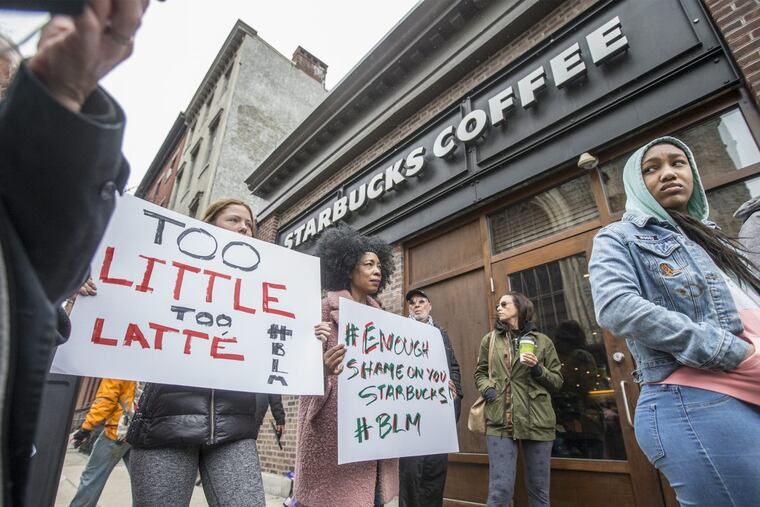Ex-Philly Starbucks director claims she was fired following wrongful arrests because she’s white
A white former regional operations director of Philadelphia-area Starbucks claims the coffee empire fired her in efforts to make amends with the community following the 2018 wrongful arrest of two black men at a Center City store.

A white former regional operations director of Philadelphia-area Starbucks claims the coffee empire fired her to make amends with the community after the 2018 wrongful arrest of two black men at a Center City store.
In a newly filed federal lawsuit, Shannon Phillips, who led Starbucks’ retail operations in southern New Jersey, the Philadelphia region, Delaware, and parts of Maryland, says she had nothing to do with the arrests of Rashon Nelson and Donte Robinson.
Still, she says, she was terminated less than a month after the incident because she objected to placing the white district manager at the 18th and Spruce Streets store on administrative leave for purportedly paying lower salaries to black workers than their white counterparts.
Phillips, who lives in South Jersey and worked for the coffee chain for 13 years, says Starbucks’ reason for disciplining the manager was “factually impossible," as the company’s “Partner Resources” branch sets employee salaries without input from the store’s district manager.
Instead, the lawsuit alleges, the action was prompted by the viral arrests in April 2018 of Nelson and Robinson, who were sitting in the Center City store without making a purchase. After the national backlash surrounding their arrests, the suit alleges, Starbucks aimed to “punish white employees who had not been involved in the arrests, but who worked in and around the city of Philadelphia, in an effort to convince the community that it had properly responded to the incident.”
Starbucks denies the claims in the lawsuit and is prepared to defend its case in court, a spokesperson said.
The lawsuit also claims Starbucks did not take any action against the store’s black district manager, who allegedly was responsible for promoting the employee who called police on the two black men sitting in the store before the arrests took place.
A day after Phillips protested suspending the white manager, a 15-year employee of Starbucks, she was told that she was being terminated and that “the situation is not recoverable,” the lawsuit states.
Phillips says she had been praised for her “exceptional” performance, had received a bonus a month before she was fired, and was on track for a promotion to a position with Starbucks’ government and community affairs unit until the arrests.
Phillips is suing Starbucks for loss of earning capacity, benefits, “pain and suffering, embarrassment, humiliation, loss of self-esteem, mental anguish, and loss of life’s pleasures."
Phillips’ attorney did not respond to request for comment.
The arrests of Nelson and Robinson, who were not charged, prompted national outrage and debate about race, a change in the Philadelphia Police Department’s trespassing policy, and protests against Starbucks throughout the country. The coffee chain responded by issuing a video apology and promise from CEO Kevin Johnson to “fix this,” and later closing stores across the nation for an afternoon to conduct training on racial bias.
After they were arrested, Nelson and Robinson reached an undisclosed financial settlement with Starbucks, according to a statement from the company. The agreement includes free tuition for both men at Arizona State University.
Separately, the pair also settled with the city for $1 each, and a pledge from the city to spend $200,000 on a program dedicated to teaching Philadelphia public school students about financial literacy, entrepreneurship, and the impact small businesses can have on a community. The resources should pay for more than 100 students’ education through January 2021.